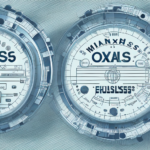Introduction to Weighing Scales
Weighing scales are essential devices used to measure the weight of objects or substances accurately. They play a crucial role in various industries, including food production, pharmaceuticals, manufacturing, and logistics. The precision of a weighing scale is vital for tasks such as trade transactions, recipe formulation, quality control, and inventory management.
There are several types of weighing scales available, each designed to meet specific needs:
- Mechanical Scales: Utilize springs or levers to measure weight. They are typically durable and do not require a power source.
- Digital Scales: Use electronic sensors to provide precise and easily readable measurements. They often come with additional features like tare functions and digital displays.
- Analytical Balances: Highly sensitive instruments capable of measuring weight with precision up to a fraction of a milligram. Commonly used in laboratories and research facilities.
Advancements in technology have significantly enhanced the functionality and user experience of modern weighing scales. Features such as automatic calibration, data logging, and connectivity options like USB, RS232, and Ethernet ports have made these devices more sophisticated and versatile.
For a comprehensive understanding of different types of weighing scales, refer to the Scientific.net Weighing Scales Overview.
Overview of the Ohaus D51XW Scale
The Ohaus D51XW is a high-precision bench scale designed for a wide range of applications in the food industry, laboratories, and manufacturing settings. This scale is renowned for its accuracy, durability, and advanced features. Key specifications include:
- Weighing Capacity: Up to 50 kg
- Readability: 0.5 g
- Platform: Large stainless steel surface, easy to clean and resistant to corrosion
- Display: Bright backlit LCD screen for clear visibility in various lighting conditions
Additional Features:
- Built-in rechargeable battery for portability and uninterrupted operation
- Advanced functionalities including dynamic weighing, checkweighing, and percent weighing
- Connectivity options such as RS232, USB, and Ethernet ports for seamless data integration
These features make the Ohaus D51XW a versatile tool suitable for environments that demand high precision and reliable performance. For more detailed specifications, visit the Ohaus D51XW Product Page.
Overview of the Cardinal Scale CWL-40
Cardinal Scale is a well-respected manufacturer offering a diverse range of weighing solutions tailored to various industrial needs. The Cardinal Scale CWL-40 is a bench scale known for its accuracy, durability, and user-friendly design. Key specifications include:
- Weighing Capacity: Up to 40 kg
- Readability: 5 g
- Platform: Robust stainless steel construction designed for heavy-duty use
- Display: Backlit LCD for easy reading in low-light environments
Cardinal Scale also offers a variety of other scales, including floor scales and truck scales, catering to different industrial applications. Their software solutions, such as WinVRS and SnapStream wireless technology, facilitate efficient data management and real-time data transfer.
For more information about the CWL-40 and other products, visit the Cardinal Scale CWL-40 Product Page.
Comparative Analysis: Ohaus D51XW vs Cardinal Scale CWL-40
When selecting a weighing scale, it's essential to evaluate various factors to determine which model best suits your specific needs. Below is a comprehensive comparison of the Ohaus D51XW and Cardinal Scale CWL-40 based on several critical criteria.
Features and Specifications
- Ohaus D51XW:
- Weighing Capacity: 50 kg
- Readability: 0.5 g
- Platform: Stainless steel, large and easy to clean
- Display: Backlit LCD
- Connectivity: RS232, USB, Ethernet
- Additional Features: Dynamic weighing, checkweighing, percent weighing
- Cardinal Scale CWL-40:
- Weighing Capacity: 40 kg
- Readability: 5 g
- Platform: Heavy-duty stainless steel
- Display: Backlit LCD
- Connectivity: RS232
- Additional Features: Adjustable filter, check weighing function
Accuracy
Accuracy is paramount in weighing applications. The Ohaus D51XW offers a higher level of precision with a readability of 0.5 g, making it suitable for applications that require meticulous measurements. In contrast, the Cardinal Scale CWL-40 has a readability of 5 g, which is adequate for general industrial purposes but may not meet the stringent accuracy requirements of specialized fields.
According to the Ohaus official website, the D51XW utilizes advanced sensors to maintain consistent accuracy even in demanding environments. Meanwhile, Cardinal Scale emphasizes the CWL-40’s reliability and precision in industrial settings.
Performance
- Weighing Capacity: The Ohaus D51XW’s 50 kg capacity allows for the handling of larger or bulkier items compared to the CWL-40’s 40 kg capacity.
- Connectivity: The D51XW offers multiple connectivity options, including USB, RS232, and Ethernet, facilitating better integration with various data systems. The CWL-40 primarily features an RS232 port, which may limit its compatibility with newer data management systems.
- Durability: Both scales are built for industrial use; however, the Ohaus D51XW boasts a higher IP rating, enhancing its resistance to dust and water, thereby extending its operational lifespan in harsh environments.
Performance evaluations by Industry Scale Comparison indicate that the Ohaus D51XW excels in data integration capabilities and offers faster response times, making it a preferred choice for high-demand applications.
Ease of Use
- Ohaus D51XW:
- Intuitive interface with easy-to-navigate menus
- Built-in checkweighing function for quick assessments
- Multiple connectivity options for seamless data transfer
- Cardinal Scale CWL-40:
- Simple layout requiring minimal training
- Tare function for excluding container weights
- Basic RS232 port for integration with existing systems
User feedback from platforms like Trustpilot indicates that both scales are user-friendly. However, some users prefer the advanced functionalities of the Ohaus D51XW for more complex tasks.
Maintenance and Calibration
- Ohaus D51XW:
- Recommended to calibrate at least once a year, with increased frequency under heavy use or harsh conditions
- Regular cleaning of the weighing platform to prevent debris buildup
- Professional calibration services are recommended to maintain optimal performance
- Cardinal Scale CWL-40:
- Annual calibration, with more frequent checks based on usage intensity
- Periodic inspection of load cells and wiring to ensure functionality
- Consistent cleaning to maintain accuracy and prevent contamination
Adhering to these maintenance schedules is crucial for prolonging the lifespan and ensuring the reliability of both scales. Detailed maintenance procedures can be found in the Ohaus Maintenance Guide and the Cardinal Scale Maintenance Instructions.
User Reviews
- Ohaus D51XW:
- Praised for its high accuracy and rapid stabilization time
- Appreciated for its robust build and intuitive interface
- Some users have reported challenges with the calibration process, necessitating professional assistance
- Cardinal Scale CWL-40:
- Commended for its durability and ease of use
- Valued for its reliable performance in industrial settings
- Occasional feedback mentions limited advanced features compared to competitors
Overall, both scales receive positive feedback for their reliability and accuracy, with specific strengths catering to different user needs. Detailed reviews can be found on platforms like Gartner and Capterra.
Price Comparison
Pricing is a significant consideration when selecting a weighing scale:
- Ohaus D51XW: Priced between $1,200 and $1,500, reflecting its advanced features and higher capacity.
- Cardinal Scale CWL-40: More affordable, typically ranging from $800 to $1,000, making it an attractive option for businesses with budget constraints.
According to Pricing.com, the price difference is justifiable for users requiring the specific advanced functionalities and higher capacity offered by the Ohaus D51XW.
Choosing the Right Scale for Your Needs
Deciding between the Ohaus D51XW and Cardinal Scale CWL-40 depends on your specific application requirements, budget, and desired features:
- Ohaus D51XW: Ideal for high-precision applications in laboratories and food production. Its advanced features, higher capacity, and superior data integration capabilities make it suitable for environments where accuracy and efficiency are paramount.
- Cardinal Scale CWL-40: Excellent for industrial applications that require durability and simplicity. Its affordability and robust design make it a great choice for businesses focused on basic weighing needs without the necessity for advanced features.
Evaluate your operational requirements, the level of precision needed, and your budget to determine which scale aligns best with your objectives.
Conclusion: Final Thoughts on Ohaus D51XW vs Cardinal Scale CWL-40
Choosing the most suitable weighing scale involves a careful assessment of factors such as accuracy, performance, ease of use, maintenance, user reviews, and price. Both the Ohaus D51XW and the Cardinal Scale CWL-40 are reliable and accurate scales, each offering unique features that cater to different applications and industry needs.
By thoroughly evaluating your specific requirements and considering the strengths and limitations of each scale, you can select the weighing device that best fits your operational demands, ensuring efficiency, precision, and reliability in your processes.






















